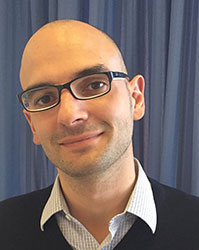非常抱歉,
你要访问的页面不存在,
非常抱歉,
你要访问的页面不存在,
非常抱歉,
你要访问的页面不存在,
验证码:

职称:professor
所属学校:Massachusetts Institute of Technology
所属院系:Nuclear Science and Engineering
所属专业:Nuclear Engineering
联系方式:+1-(617)-715-2336
PhD in Nuclear Engineering, University of Pisa, 2009 MSc in Nuclear Engineering, University of Pisa, 2005
Reactor Design and Safety Analysis My research interests include multi-phase flow and heat transfer, advanced experimental diagnostics, reactor thermal-hydraulics, materials and safety. I work in cooperation with Profs. Buongiorno, Short and Baglietto and Dr. McKrell. My current research is focused in three areas: Development of advanced diagnostic tools and techniques We develop advanced diagnostics to study the physics of two-phase flow and heat transfer phenomena. The research includes the development of advanced Infra-Red thermography techniques combined with High-Speed Video, the development of new materials solutions, coatings and engineered surfaces for heat transfer investigations, and the characterization of their physical properties. The modelling of multi-scale, multi-physics phenomena, i.e. combining heat transfer and optics, is key to developing and optimizing these diagnostics. Boiling heat transfer We design and perform experiments to shed light on the physics of boiling heat transfer and obtain detailed experimental data to inform and validate computational models used for the design and the safety analysis of nuclear reactors. Surface effects (e.g. wettability and porosity) are also investigated by means of nano-engineered surfaces and coatings. To achieve a superior understanding of these phenomena, we develop advanced diagnostic tools and techniques. Measured quantities include but are not limited to: time dependent temperature, heat flux and phase distributions on the boiling surface, onset of nucleate boiling temperature and heat flux in both steady and transient conditions, bubble departure diameter and frequency, growth and wait times, nucleation site density, etc. In parallel to experiments, analytical and computational models are developed to provide a faithful representation of boiling heat transfer phenomena and surface effects on the nuclear reactor fuel. The ultimate goal is to develop a fully mechanistic flow boiling model to predict boiling heat transfer phenomena in nuclear reactors, from the onset of nucleate boiling to the critical heat flux. Materials for Waste Annihilating Molten Salt Reactor We study materials to improve the efficiency, safety, economics, and technology readiness of the Waste Annihilating molten Salt Reactor (WAMSR). Among the main concerns to be addressed are long-term static and flowing corrosion, irradiation effects and fouling resistance. To address these concerns, we develop and evaluate corrosion and radiation resistant Multi-Metal Layered Composites (MMLC).